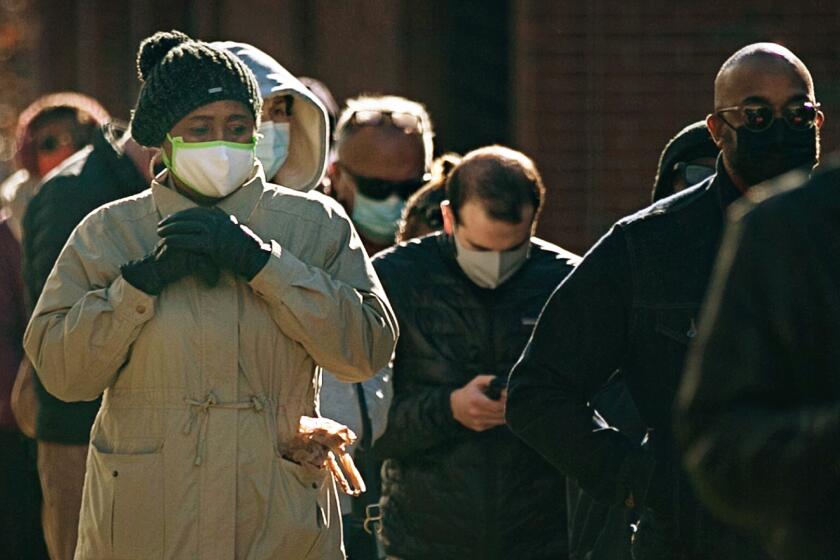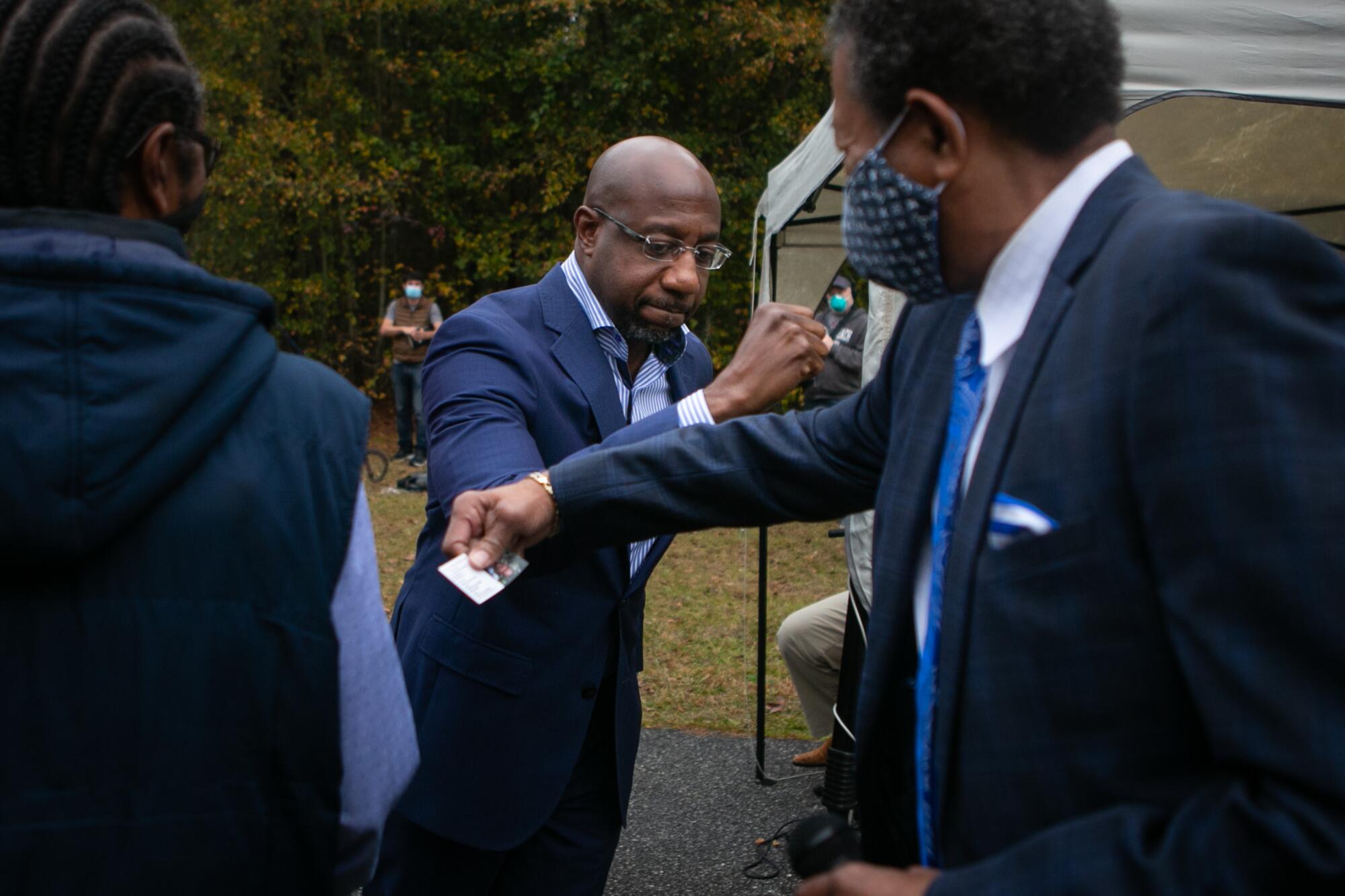
- Share via
FAYETTEVILLE, Ga. — The Rev. Josh Saefkow plopped down on his office couch between services, facing a TV tuned to Fox News. He skimmed sermon notes, glancing up as an ad aired in support of the Rev. Raphael Warnock, the Atlanta preacher running as a Democrat for the U.S. Senate, and shook his head.
“He’s a gifted orator but not a good student of Scripture,” said the 36-year-old white evangelical minister and lifelong Republican, who had hosted a get-out-the-vote rally days before at the Flat Creek Baptist Church hall. “I don’t understand how a pastor can stand up there and say he’s for allowing abortion.”
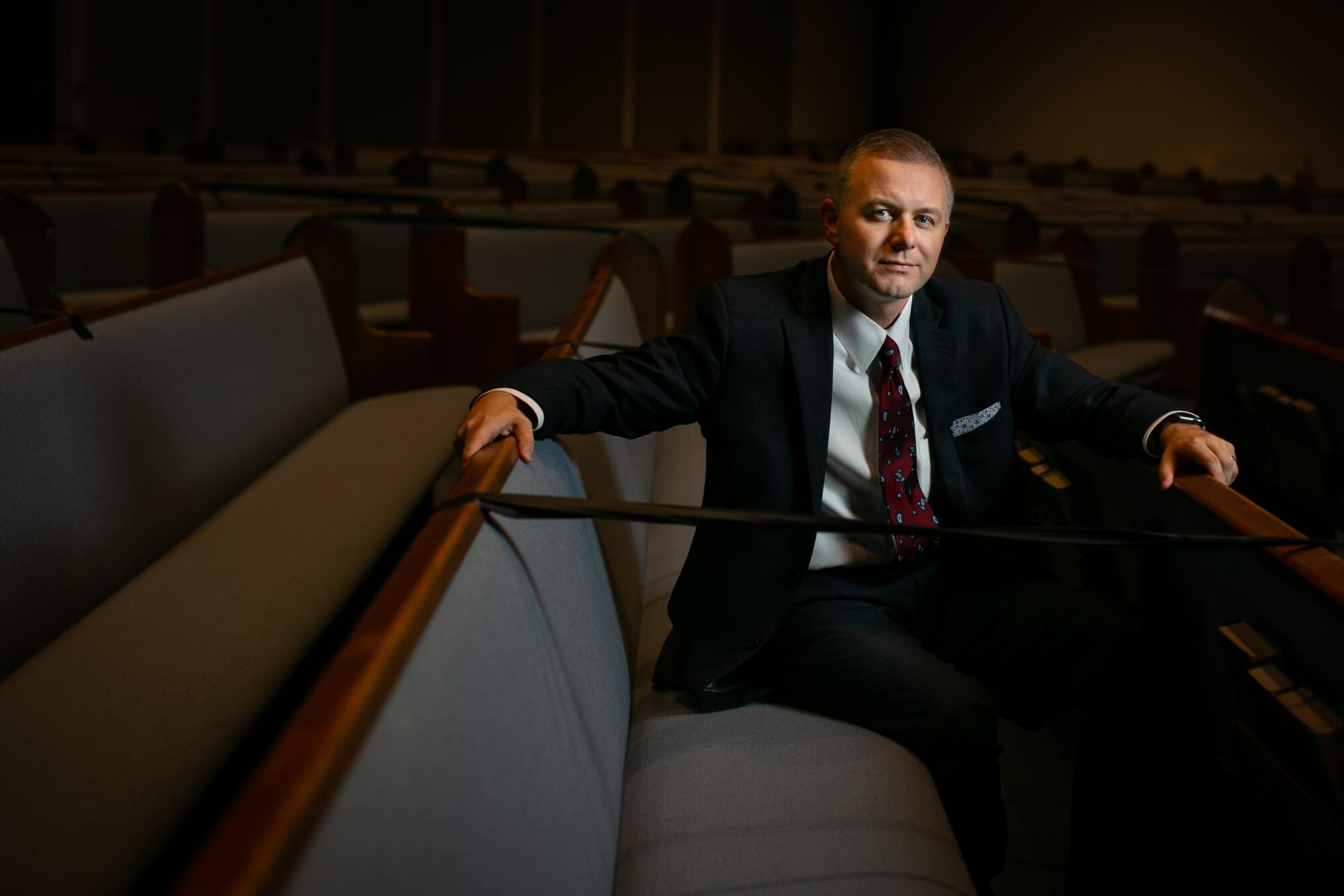
Ninety minutes south of Fayetteville in Columbus, the Rev. Ralph Huling stepped up to a wooden pulpit in the parking lot of St. James Missionary Baptist Church to introduce Warnock to his spread-out congregation.
The 71-year-old Black minister described church as a metaphor for government. He told his mostly Black flock that a new pastor could get little done without deacons on his side.
“That’s why we’re going to see Raphael Warnock and Jon Ossoff to the Senate,” he said to blasting car horns. “So that Pastor Biden — I mean President Biden — can get some bills passed!”
Since Georgia went blue in the presidential race for the first time in decades, the nation’s eyes are again on the state, where two runoffs Jan. 5 will decide which party controls the Senate. Images of the new South, where Democrats hope Black, Latino and Asian American voters come out in force next month, coexist with the divisions of the old, where Sunday services lay bare racial and political divides as candidates and their surrogates appeal to the faithful.
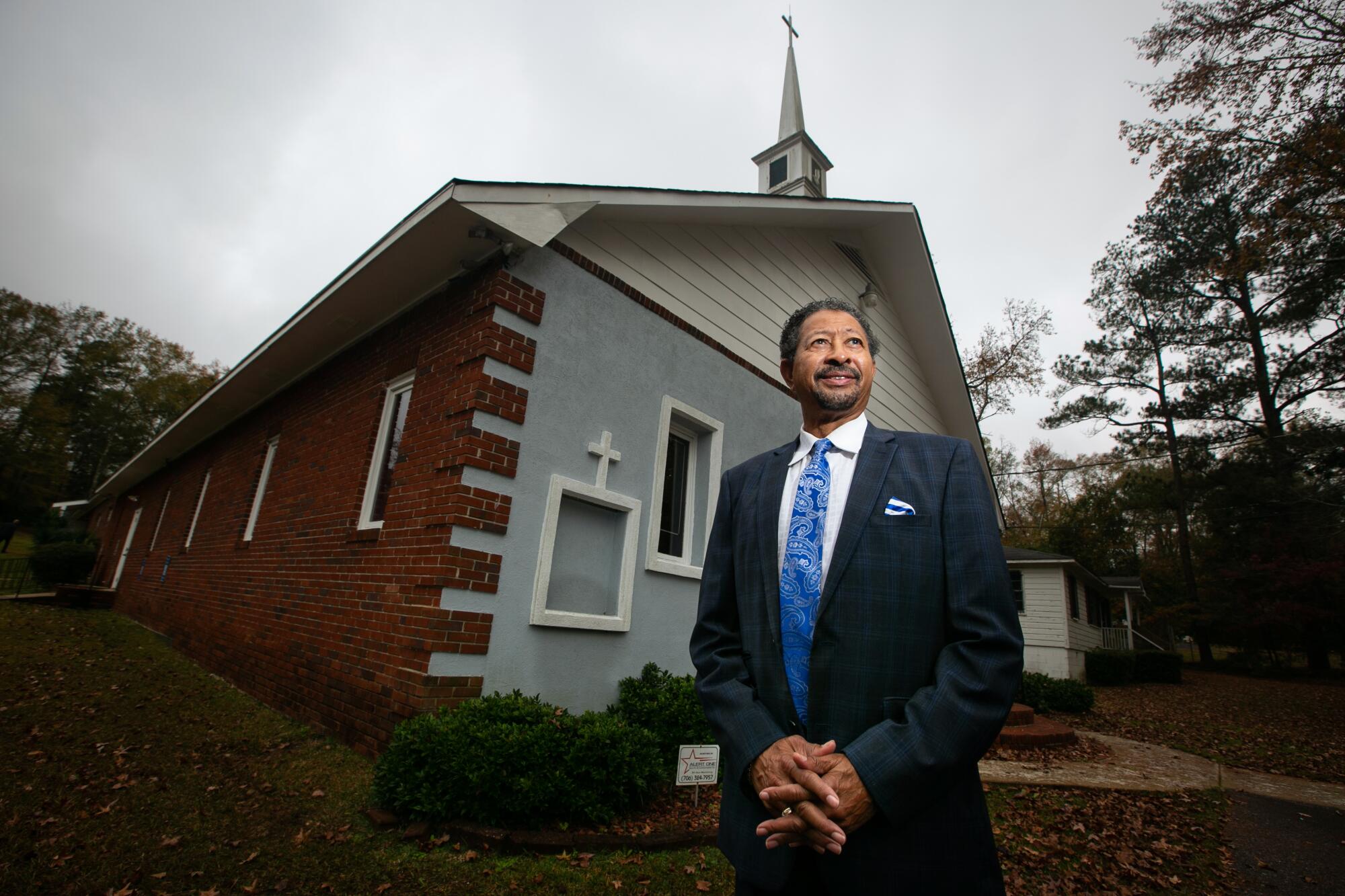
Religion has played a role in every American election. But it’s taken on new meaning in this heated political season with the candidacy of Warnock, an outspoken liberal pastor who’s spent 15 years in the pulpit at Martin Luther King Jr.’s red brick Atlanta church, Ebenezer Baptist. He faces incumbent Republican Kelly Loeffler, a millionaire businesswoman and Catholic whose ads call him anti-American and anti-Christian.
In another race, Democratic challenger and filmmaker Jon Ossoff could become the first Jewish senator from the Deep South since Reconstruction in a faceoff against incumbent Republican Sen. David Perdue, a Methodist and former chief executive in office since 2015.
Nearly $500 million has poured into the state from both parties, political action committees and activists. But more notable may be how much faith-based groups have stepped in.
The New Georgia Project, a voting organization founded by former Democratic gubernatorial candidate Stacey Abrams, has fanned across the state to partner with houses of worship. Muslim and Jewish activists rushed this month to register new voters from their communities, which typically go for Democrats. Warnock and Ossoff have hopped among churches for parking lot rallies. In one week in December, Warnock appeared at churches in the cities of Augusta, Clarkston, Warner Robins and Columbus, many of them with Black congregations.
On the other side, the Faith and Freedom Coalition, a conservative network, has more than 1,000 staffers canvassing in person or on the phone to target evangelical voters. The Susan B. Anthony List, an anti-abortion group, has vowed to knock on 750,000 doors before next month.
In mid-December, David Barton, a prominent evangelist from Texas known for promoting the idea that the American separation of church and state is a myth and for recruiting conservative pastors into politics, led a barnstorm on “biblical citizenship” across half a dozen packed churches in Georgia to get voters to the polls.
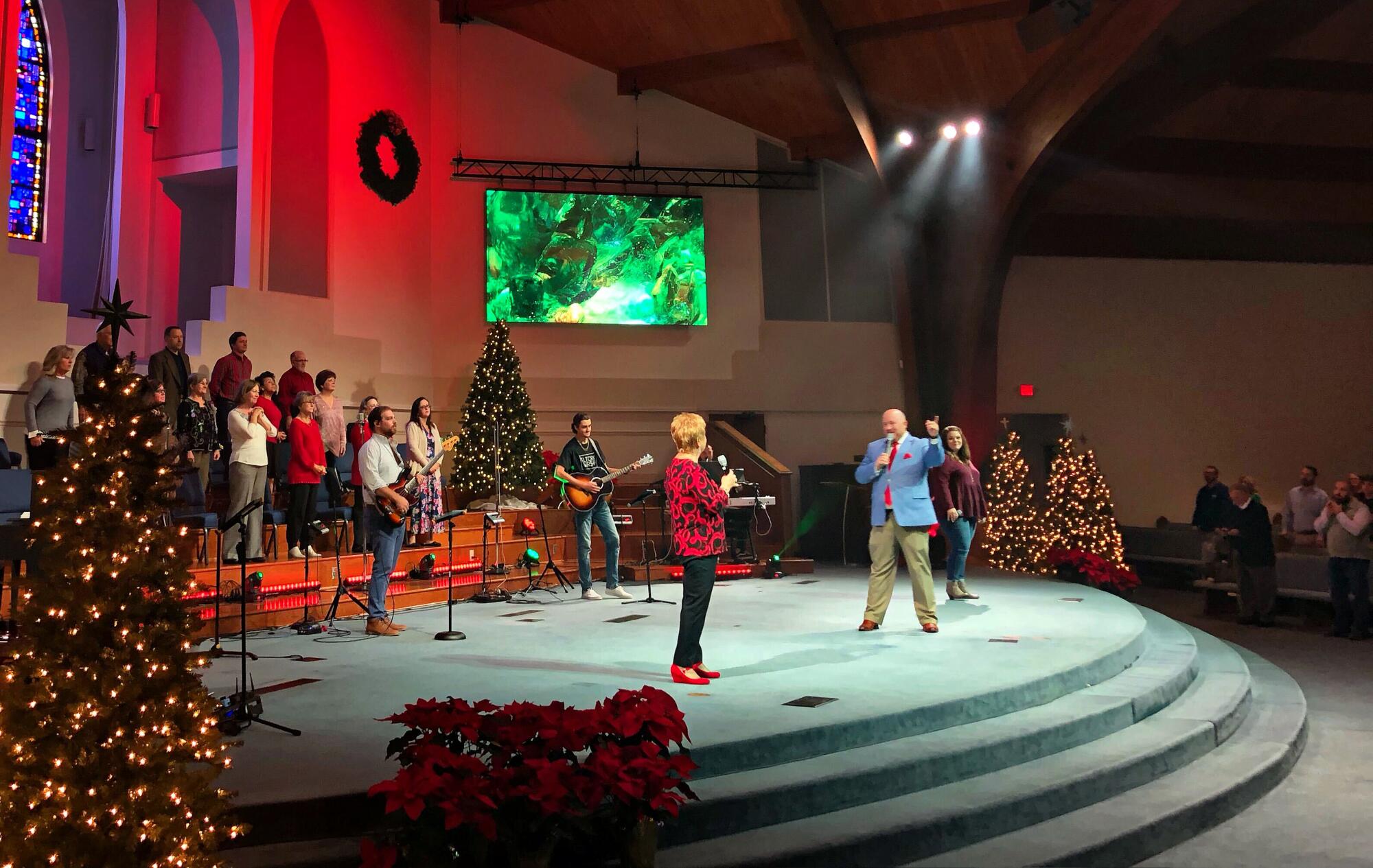
Saefkow hosted Barton and his organization, WallBuilders, at his Fayetteville church, 40 minutes south of downtown Atlanta in a suburban county where voters tilted slightly toward President Trump last month. A duo sang Lee Greenwood’s “God Bless the U.S.A” and “America the Beautiful” before speakers shouted down the “communist” and anti-Christian trends they saw in education and politics. In a taped message, right-wing author Dinesh D’Souza and his wife, Debbie Fancher, told attendees their votes were crucial.
“God doesn’t act directly in the world. He relies on us to be his arms and legs. Let’s mobilize all our effort on behalf of these two Republican Senate candidates,” D’Souza said.
Fancher added: “Trump has been the most pro-life, pro-Israel and pro-religious-freedom president in our lifetime. Let’s protect these principles not only in the White House but also in Congress.”
It excited Saefkow. A graduate of Liberty University, he grew up in Ohio with an atheist father and a mother who followed the New Age movement before he converted after befriending a pastor as a child.
Saefkow, who said his “ultimate authority is Jesus, not any man or politician,” was nonetheless concerned about a Democratic majority in the Senate that would give the new president few obstacles in his agenda.
After the Warnock ad finished that recent Sunday, Saefkow went back for his second service, where he told the 200 congregants to spread their faith “out into the world,” quoting Philippians 2:15. The crowd was mostly white Republicans with a spattering of Democrats, and the message wasn’t just about the election. It was about taking the Bible, Saefkow said, and applying it to everyday life.
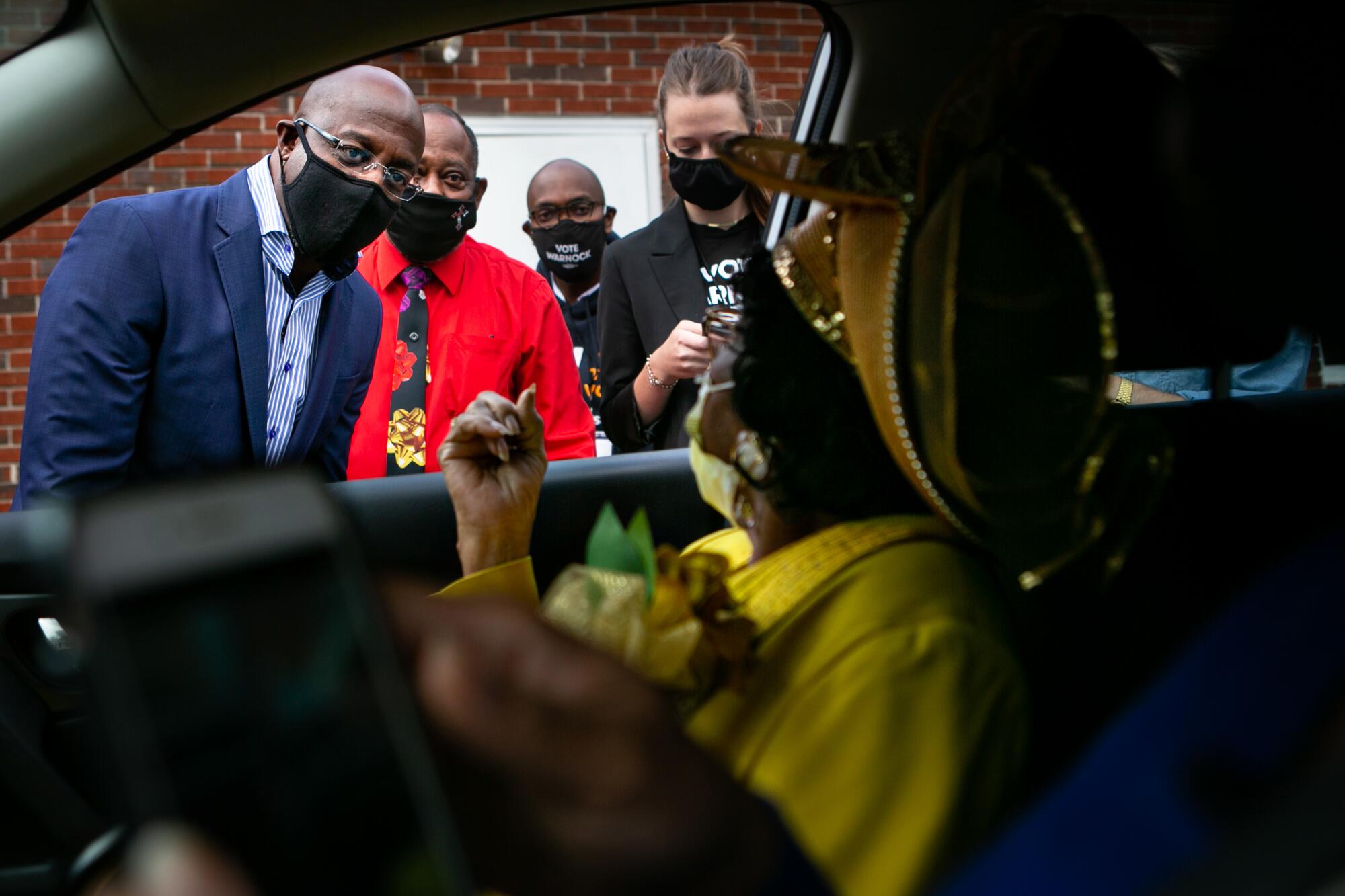
Around the same time in Columbus, a crowd of more than 50 gathered outside St. James Missionary Baptist’s humble red brick building topped with a white steeple. Some quietly leafed through Bibles inside their cars, others stepped out onto the asphalt to worship under a cloudy, gray sky.
Early in the pandemic, St. James shut its doors, though for months now it has held services in the parking lot, broadcasting online.
Addressing the faithful lined up in BMWs, Chevrolets and Volkswagens, Warnock delivered a faith-infused stump speech.
He reminded Christians that Jesus spent much time healing the sick — including those with “preexisting conditions” like blind Bartimaeus and the bleeding woman.
Warnock did not mention his opponent, Loeffler, by name, and said he was uninterested in the attacks against him. “I know who I am; I’m a child of God,” he said. “I’m going to spend my time thinking about you and the work that God has called me to do.” He ended with a reminder that early voting was starting.
In an interview, Huling said he felt the election meant too much to avoid talking about politics.
“Everybody knows what’s at stake,” he said. “Their healthcare is on the ballot. Police brutality, criminal justice reform is at stake. What we’re really looking at is this country which we love so much, this country that has been so good to us, we just want this country to live up to its creed.”
Four candidates are on the slate next month. But Warnock has become the center of attention for both parties. For Democrats, his strong ties with the Black church are a plus. But Republican critics cite his sermons. Ads for Loeffler call him a “socialist” and point to preaching that echoes Black liberation theology, a school that says Christian faith can play a key role in fighting racism and uplifting racial minorities.
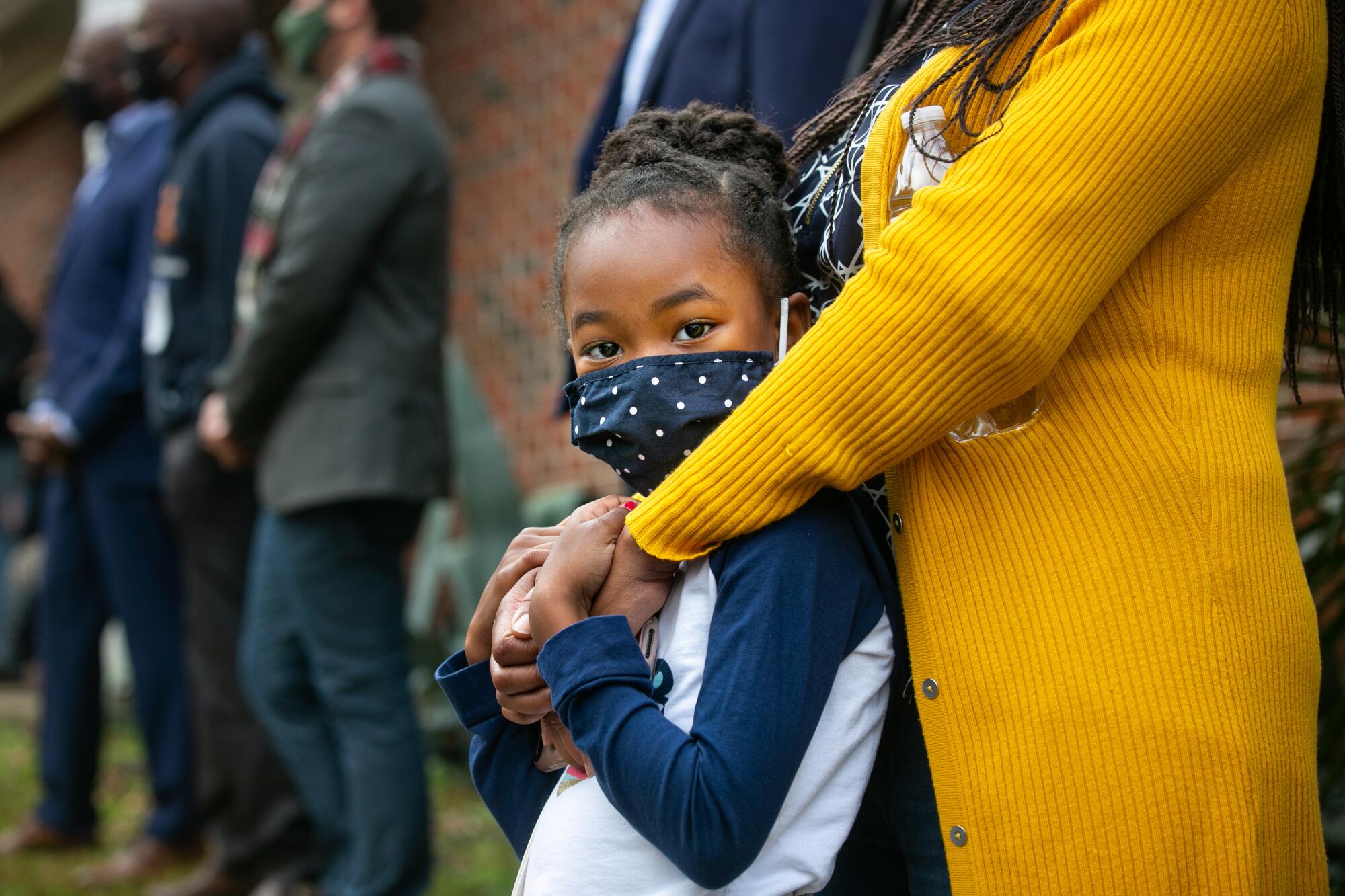
In one service from nearly a decade ago that Republicans have singled out, Warnock gives a nod to Matthew 6:24, which says “no one can serve two masters.” In the sermon, Warnock said, “America, nobody can serve God and the military. You can’t serve God and money. You cannot serve God and mammon at the same time. America, choose ye this day who you will serve.”
In another address from four years ago at Emory University, Warnock said, “America needs to repent for its worship of whiteness.”
The statements bother those like Saefkow. “Certainly you can serve in the military and be faithful to God,” he said in an interview. As a campaign focus, he said, racism was the “lowest hanging fruit.” “We don’t celebrate enough the progress we have made since the civil rights movement.”
The biggest issue to many religious voters is abortion. Warnock supports abortion rights and has opposed Republican Georgia Gov. Brian Kemp’s “heartbeat” bill, which attempted to ban most abortions after six weeks. “A patient’s room is too small a place for a woman, her doctor, and the U.S. government ... These are deeply personal healthcare decisions — not political ones,” Warnock has said in statements.
Surveys show him to be in line with the majority in his faith tradition. A Pew Research Center poll from last year found that 64% of Black Protestants believed abortion should be legal in all or most cases. But 77% of white evangelicals said the opposite.
“To say you’re a pastor and pro-choice is an egregious misuse of Scripture,” said Saefkow, who recently spoke at a religious freedom organization’s event that featured Loeffler, who is against abortion rights.
Personally and theologically, Huling said he thought abortion was wrong. But he agreed with Warnock.
“Republicans, they like to shout that they are pro-life, but then when a child is born do nothing to help the child that’s born in poverty. They don’t care... Republicans like to tout Raphael Warnock as a liberal or a radical, but we need some radical changes.”
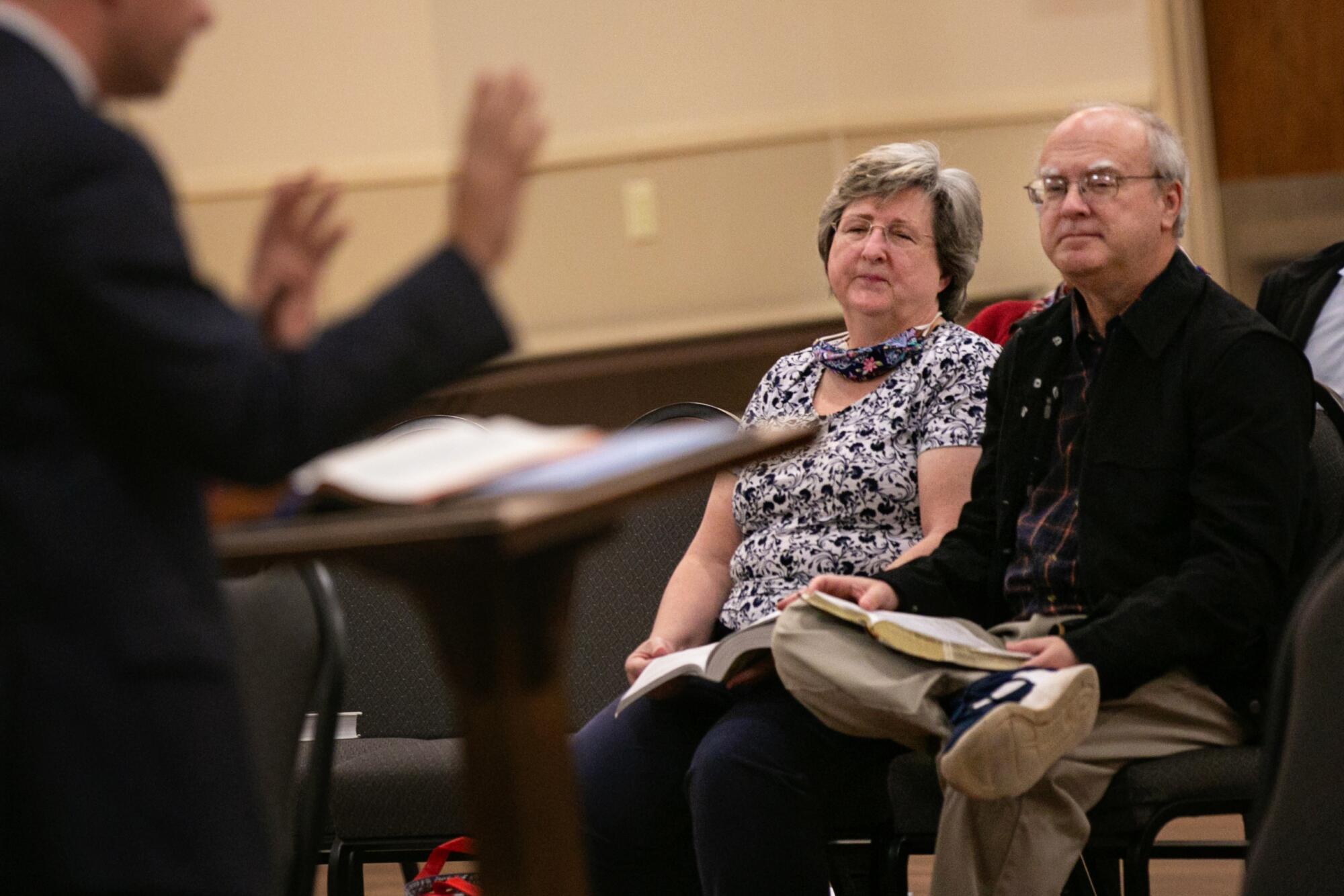
Saefkow believes in helping those in poverty, too. But sometimes, he said, the job is better done by the church than the government. That Sunday, his congregation hosted a toy drive to collect hundreds of Christmas gifts for kids in poor families. At services, ministers took donations for Lottie Moon, a denomination-wide fundraiser to support international missions.
Huling, whose community has seen the pain of unemployment and the pandemic close-up this year, thought the government had a bigger role to play in fixing the wrongs of the past and present.
“We have seen people lose jobs, we’ve seen people lose their places of abode, we’ve seen people that are hungry,” he said. “People are hurting across this nation, and it’s not just African Americans,” he said in an interview. Voting for Democrats, he said, was a step toward solutions.
At the end of his sermon Sunday, which centered around Micah 5:2, Huling drove his point home to his congregation. “They want to knock my friend Rev. Warnock for preaching social justice,” he shouted. “But if the church — God almighty — doesn’t stand for social justice, then tell me: ‘Who will?’”
There was a cacophony of car horns, and a man standing in the parking lot yelled, “Who will?”
Times staff writers Kaleem and Jarvie reported from Fayetteville and Columbus, Ga., respectively. Times video journalist and producer Nani Sahra Walker contributed to this article.
More to Read
Sign up for Essential California
The most important California stories and recommendations in your inbox every morning.
You may occasionally receive promotional content from the Los Angeles Times.
